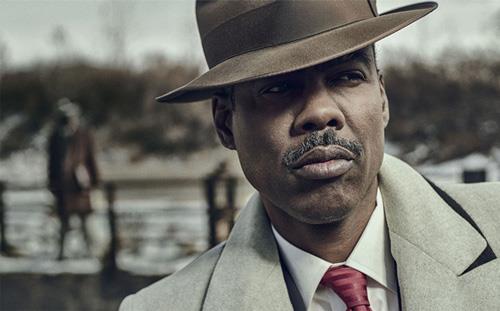
Early in the long-awaited new season of Fargo, which is set in Kansas City in 1950, a prominent Italian businessman is accidentally shot in the neck by a couple of dopey young boys fooling around with toy guns in the park.
The man's associates rush him to the nearest hospital, where they tell the nurse who greets them that he needs to see a doctor at once.
Instead, the nurse summons the hospital administrator, who tells the men this is a private hospital that does not serve "your kind." He redirects them to a public hospital several miles away. That hospital, he assures them, will treat anybody.
In a touch lost on these men, but not on viewers, they had moments earlier been bantering about how they were better than Black folks.
Not better enough, it turns out, to transcend being scorned by the White establishment as "dirty Italians."
The fourth season of Fargo, which premieres Sunday at 9 p.m. ET on FX, subtly and not so subtly expands on that point: America has always been much more about ethnic, social, and class standing than we prefer to think.
With the fruits of the civil rights era still a few years down the line, Kansas City in 1950 remains a Southern town, with White and Black as separate as law and custom can keep them.
So it's a bold move when Loy Cannon (Chris Rock, top) and some of his Black friends come into town looking to get a piece of the illegal action controlled by the Italian mob, which a few years earlier had seized control by gunning down the Irish mob.
Creator/writer/director Noah Hawley underscores the significance of the racial element by inserting a narrator: Ethelrida Pearl Smutney (Emyri Crutchfield), the 16-year-old daughter of a mixed marriage.
Her father, Thurman (Andrew Bird), runs the King of Tears funeral home, where he handles the White funerals, and his wife handles the Black funerals.
Pearl is a smart student who is routinely punished by her school's White administrators for being smart, which they see as arrogant. Specifically, she is beaten with a wooden paddle, which she accepts because that's just the way it is.
Arriving home one afternoon as a White funeral is wrapping up, Pearl runs into a sobbing woman named Oraetta Mayflower (Jessie Buckley).
While that encounter passes quickly, with an odd note of discomfort, we soon meet Miss Mayflower again. She turns out to be a nurse at the public hospital to which the Italian man is finally taken.
Small world, eh?
And soon, like so many Fargo characters past and present, Miss Mayflower turns out to have a dark side.
Along with the dueling male mobs, she sends Fargo where we expect it to go, into territory that is deeply disturbing, darkly comic, and uniquely stylized.
If Hawley has taken Fargo some distance from the original Coen brothers movie, he has kept its tone. It's still not quite like anything else.
The show revolves primarily around the mob competition, with a small army of interesting and quirky characters on both sides. Fargo remains very much an ensemble show even as Rock's Cannon becomes the character through which much of the action flows.
That group effort serves the drama well and enables Rock to blend into the story without having viewers constantly think, "Wow, that's Chris Rock, the comedian. I've never seen him like this before."
Past TV seasons of Fargo, perhaps a bit more than the movie, have slipped in some social commentary. Hawley creates outsiders, and whatever their morality and demons, reminds us that the American power structure likes to keep outsiders outside.
Like past Fargo seasons, this one has a great look. It's not the bleak North Dakota and Minnesota winters, but there's snow on the ground, and Kansas City looks like it's been washed with sepia tones. Don't expect a lot of sunshine.
Hawley still employs some visual gimmicks, like split screens and printed on-screen character IDs. They're harmless, a familiar part of the stylizing.
Fargo's third season ended up taking a different direction from the first two, finishing on a note of disturbing ambivalence. A Fargo ending has always mattered less than the ride, however, and this latest journey starts on course.